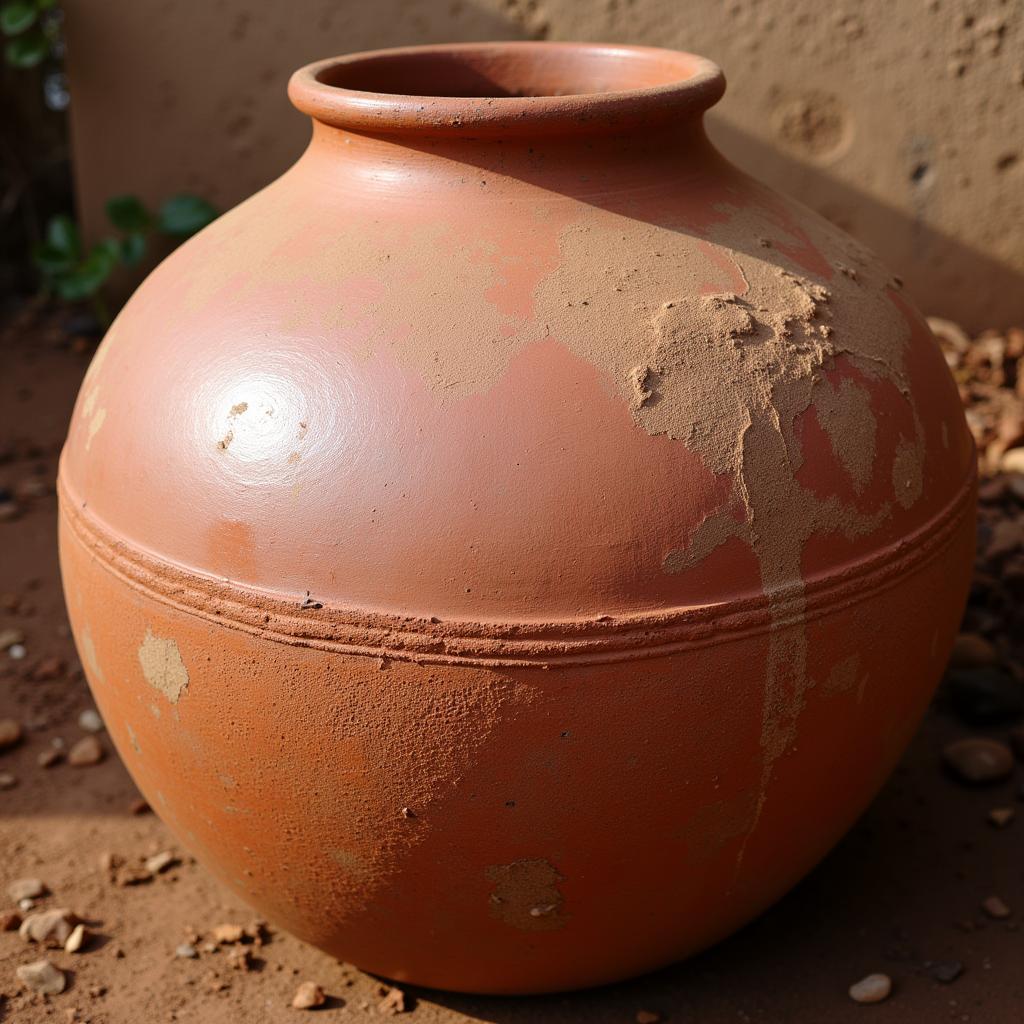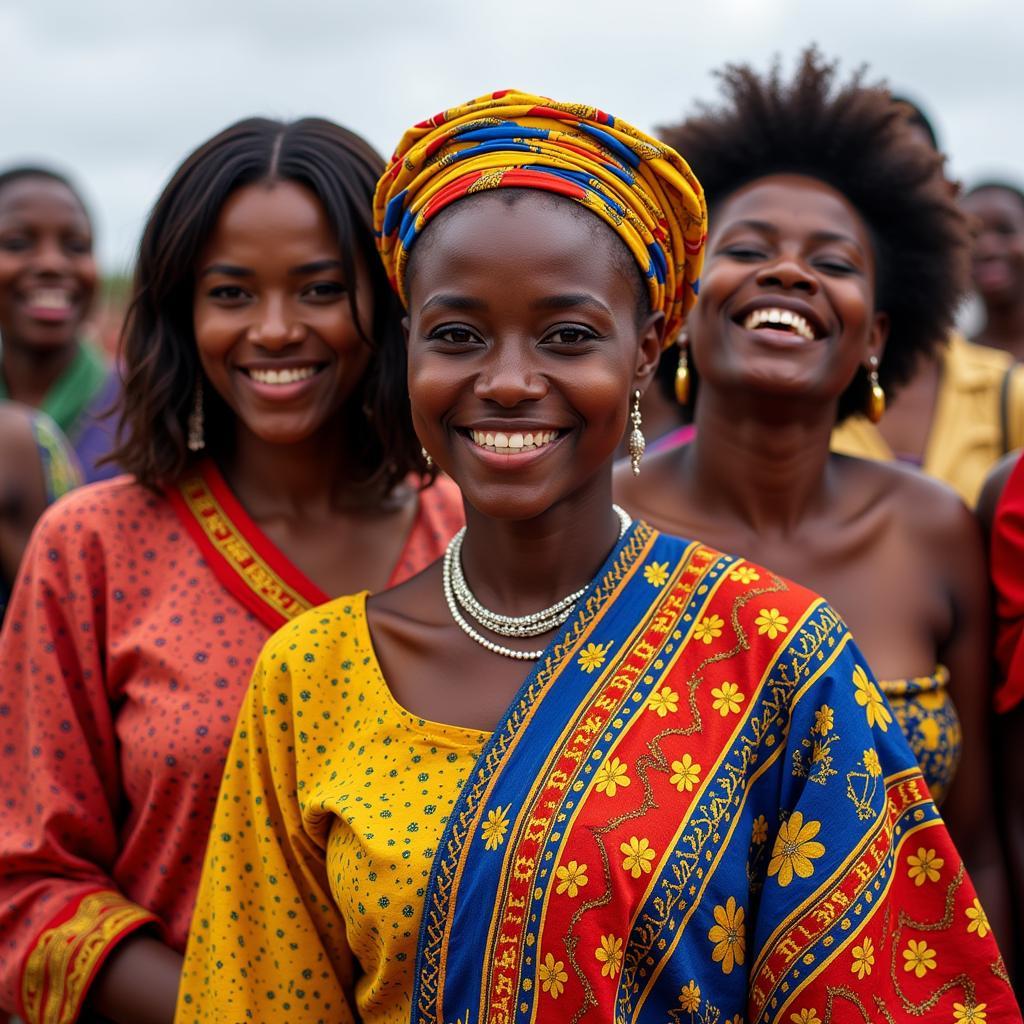Unraveling the Myths of the African Hyena Tribe
The term “African Hyena Tribe” often evokes images of cunning scavengers laughing maniacally in the moonlight. However, this popular perception barely scratches the surface of these complex and fascinating social creatures. Understanding hyena society requires moving beyond the stereotypes and delving into their intricate social structures, communication methods, and ecological roles.
Inside the Complex World of Hyena Clans
Hyena social structures are more akin to primate societies than other carnivores. They live in large, stable groups called clans, which can number from a few dozen to over a hundred individuals. These clans are matriarchal, meaning females hold the dominant positions. This female dominance permeates all aspects of hyena life, from access to food to determining social rank. Within these clans, there’s a complex hierarchy with a dominant female at the top, followed by her offspring, and then other related females and their offspring. Males generally occupy the lowest rungs of the social ladder. This intricate social order plays a crucial role in maintaining stability and cooperation within the clan. For example, access to kills is strictly regulated by rank, ensuring that the most dominant animals feed first.
African hyenas are highly intelligent and communicative animals. They have a rich vocal repertoire that includes a variety of whoops, growls, and of course, the infamous laugh. Contrary to popular belief, the “laugh” is not always a sign of amusement. It can also signal fear, excitement, or even frustration. Beyond vocalizations, hyenas also communicate through scent marking, body language, and tactile interactions. These diverse communication methods allow them to coordinate hunting efforts, maintain social bonds, and resolve conflicts within the clan.
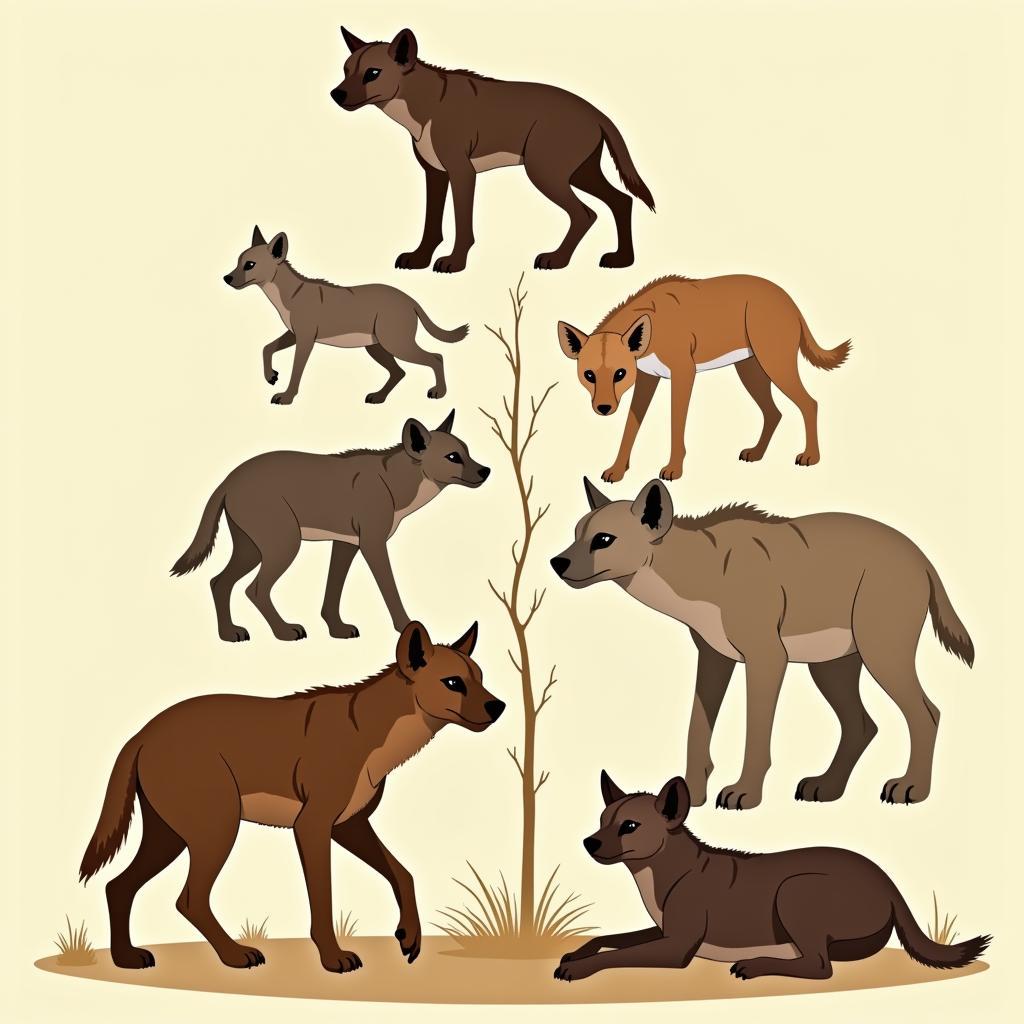 African Hyena Clan Social Hierarchy
African Hyena Clan Social Hierarchy
Debunking the Scavenger Stereotype: Hyenas as Skilled Hunters
While hyenas are opportunistic feeders and will readily scavenge carcasses, they are also highly skilled hunters. In fact, they often hunt more than they scavenge, bringing down prey ranging from small antelopes to zebras and even buffalo. Their powerful jaws and teeth, combined with their stamina and cooperative hunting strategies, make them formidable predators. Their hunting prowess plays a vital role in maintaining the ecological balance of their habitats.
African hyenas are essential components of the African ecosystem. As apex predators, they help regulate prey populations, preventing overgrazing and maintaining biodiversity. They also play a crucial role in nutrient cycling by consuming carcasses and returning essential nutrients to the soil. Understanding their ecological importance is crucial for conservation efforts.
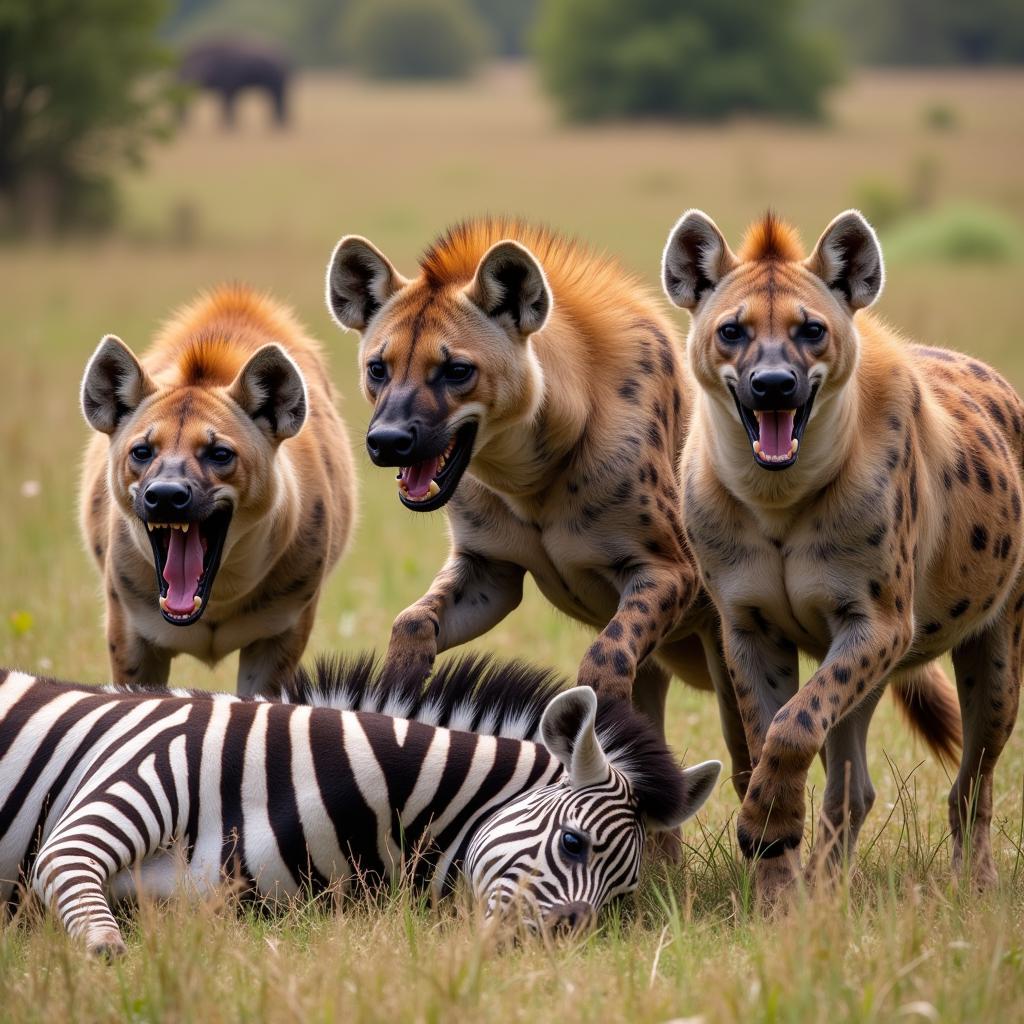 African Hyenas Hunting Zebra
African Hyenas Hunting Zebra
Are Hyenas Endangered?
While some hyena species, like the brown hyena and the striped hyena, are considered near threatened or vulnerable, spotted hyenas are currently classified as least concern by the IUCN. However, they still face numerous threats, including habitat loss, human-wildlife conflict, and persecution due to negative perceptions. Conservation efforts are crucial to ensure the long-term survival of all hyena species. These efforts include protecting their habitats, mitigating human-wildlife conflict, and educating communities about the important ecological role of hyenas.
Dr. Khadija Mwangi, a leading hyena researcher at the University of Nairobi, emphasizes the importance of conservation: “Hyenas are vital for maintaining healthy ecosystems. Protecting them benefits not only the animals themselves but also the overall biodiversity of Africa.”
Do Hyenas Have a Language?
While hyenas don’t have a language in the human sense, their complex vocalizations and communication methods suggest a sophisticated form of communication. Their “laughs,” whoops, growls, and other sounds convey a range of information, from alarm calls to social status. Dr. Mwangi explains, “Hyenas’ communication is much more nuanced than we previously thought. Their vocalizations are context-specific and can convey complex social information.”
Conclusion: Appreciating the African Hyena
The African hyena is a complex and misunderstood creature. By moving beyond the stereotypes and appreciating their intricate social structures, impressive hunting skills, and crucial ecological role, we can gain a deeper understanding of these fascinating animals and the importance of their conservation. The “African hyena tribe” is more than just a group of scavengers; they are integral members of the African ecosystem.
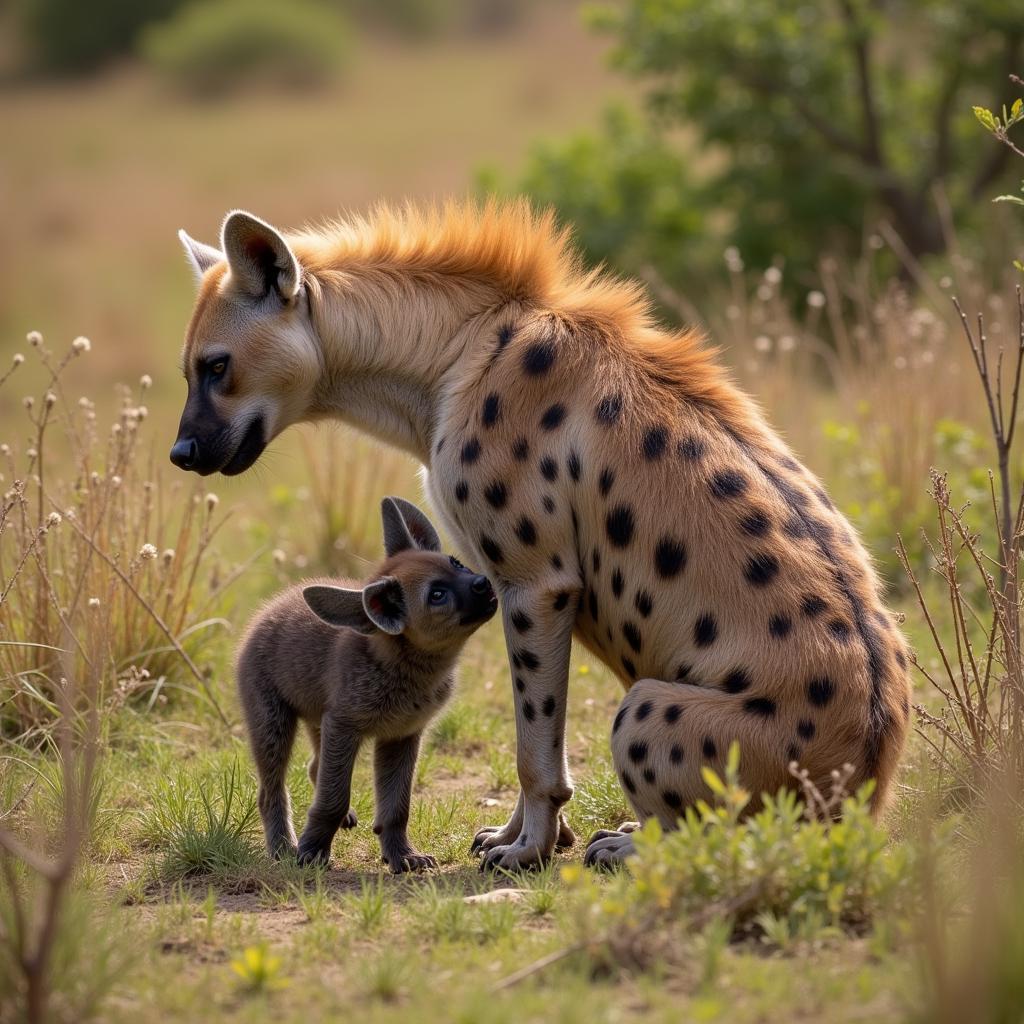 African Hyena Cub with Mother
African Hyena Cub with Mother
FAQ
- What is the social structure of hyenas? Hyenas live in matriarchal clans with a complex social hierarchy.
- Are hyenas scavengers or hunters? Hyenas are both skilled hunters and opportunistic scavengers.
- What is the role of hyenas in the ecosystem? Hyenas are apex predators that regulate prey populations and contribute to nutrient cycling.
- Are hyenas endangered? While some species are threatened, spotted hyenas are currently classified as least concern.
- How do hyenas communicate? Hyenas communicate through a variety of vocalizations, scent marking, body language, and tactile interactions.
- What is the biggest threat to hyenas? Habitat loss and human-wildlife conflict are major threats to hyena populations.
- How can I help hyena conservation efforts? Supporting organizations dedicated to wildlife conservation and educating others about hyenas can contribute to their protection.
More Questions and Articles
For more information on African wildlife, you might be interested in the following:
- What is the lifespan of a hyena in the wild?
- How do hyenas raise their young?
- What are the different types of hyenas found in Africa?
Explore more articles on our website related to African wildlife and conservation efforts.
Contact Us
When you need assistance, please contact us via Phone Number: +255768904061, Email: kaka.mag@gmail.com Or visit us at: Mbarali DC Mawindi, Kangaga, Tanzania. We have a 24/7 customer support team.

